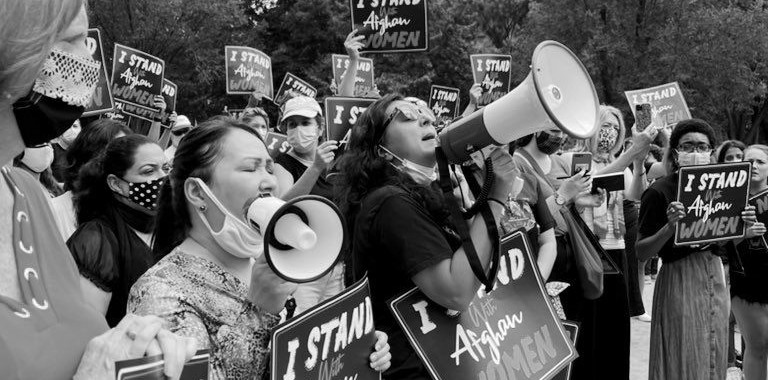We stand in solidarity with the women of Afghanistan: A statement by Dr. Roopa Dhatt
- Aug 30, 2021
- 3 min read

Broken promises, dreams squashed, and generations lost make this all the harder to acknowledge.
As a gender advocate, leading the largest global movement for women in health, and as Indian-American immigrant woman, the plight of Afghan women feels incredibly personal. I know first-hand, what opportunities mean for girls and women, especially from conservative communities that have been the most resistant to valuing them. I will not speak for the women in Afghan, but in practicing allyship, I call on our community to pay attention and call for swift action. The progress made must not be compromised and lost. Too many girls and women have been achieving their dreams and working to transform their communities, we cannot let progress have its rug pulled underneath it.
At Women in Global Health, we challenge power and privilege for gender equity in health. This is the moment that all women and allies must stand with the women in Afghan, show our solidarity. We must listen to them and be guided by their calls to action. This is the moment that we must not be silent bystanders, we must practice allyship, use our power and privilege to mobilize, advocate, garner commitments and hold our leaders accountable. This is the moment we must call on our leaders and governments to respond swiftly. Each second that passes without action is perilous to lives, livelihood, dignity, mental and physical health and well-being of girls and women.
"Now I have to burn everything I achieved" - A female university student in Afghanistan

During humanitarian crises women and girls are typically marginalized in decision making and peace talks, and face threats. Due to recent events the dire situation of the human rights of women and girls in Afghanistan has been deteriorating in all areas under Taliban control. While the Taliban claim they are a "new" generation of Taliban and that women will have a place in society. We are hearing worrisome reports, especially from women in health that they are fleeing and hiding for their lives, in addition to living in a state of fear of what will become of their girls and families. While some our sisters may go into hiding, we must stand with them and support them with our platforms. At Women in Global Health, we have opened up a new working group on Humanitarian Crises, to create a safe space for exchange and collaboration.
Women in Global Health calls for action:
We call on the Afghan authorities to support and protect women and girls rights, including providing them equal access to education and opportunities as boy and men, regardless of political or religious affiliation.
We call on all countries to hold the new government in Afghanistan to account and ensure there is no roll back of rights for girls and women.
We ask the international community to make sure that rights are for all and there will be institutions to defend them.
We also bring attention to the urgency that all governments should reduce barriers, expedite processing and increase quotas to receive refugees, especially for women and girls' activists.
Finally, as members of the global health community, during this new wave of the pandemic, we call on our community to jointly advocate particularly around the needs and protection of women in health at all levels. We launched the Gender Equal Health and Care Workforce Initiative earlier this year with the World Health Organization and the Government of France to increase visibility, dialogue and action on gender equality for health and care workers. This agenda must remain a priority in crisis response and management, as we know, we are only safe as the weakest health system in the world. Like all health system globally, the Afghan health systems, depends on its women in the health workforce -from physician, nurses, midwives, pharmacist and community health workers, they are vital to the stability of society. Estimates indicate that 19% of physicians, 40% of nurses are women, with an additional 4,000 midwives trained in the past two decades. Women in the health sector are key to resilience in their communities and health systems. They are providing access to health services for women, girls and the entire population. With the wave of uncertainty and rapid changes, women in the health workforce are in a state of fear, further risking the health systems to collapse in times of greatest need.
Now is the time to stand in solidarity with all women in Afghanistan! Solidarity includes acknowledging the struggle, raising awareness, working in allyship by amplifying the voices of Afghan women, advocating to our governments and mobilizing resources to get into the hands of women and girls I their communities.
Roopa




























































Comments